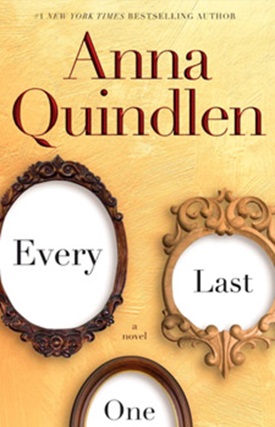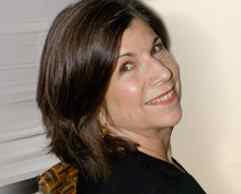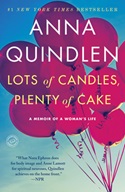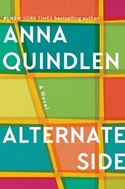 Synopsis:
Synopsis:
Anna Quindlen is the Pulitzer Prize-winning author of Object Lessons, Black and Blue, and One True Thing, among others. Every Last One not only matches, but exceeds the quality of her previous work.
The Lathams are a typical American family. Glen is an ophthalmologist, while Mary Beth owns and operates a landscape gardening business, but their three children are her priority: Daughter Ruby will soon finish high school, as twin sons Alex and Max become freshman. The Lathams seem to be living the quintessential American life, except for the fact that while Ruby (who appears to have overcome a brief struggle with anorexia) and Alex are popular and busy with school and friends, Max suffers from depression. Naturally, Mary Beth puts her energy into helping Max, getting him into treatment with a therapist who understands Max’s conflicted feelings about being a fraternal twin far better than most.
Ruby’s boyfriend, Kiernan, has been like a member of the Latham family his whole life. Mary Beth and his mother were once the best of friends, and he grew up in the house next door to the Lathams. But Ruby is thinking about college and wants to be free to explore. When she breaks up with Kiernan, the young man continues to come to the house, sneaking into her room to leave her gifts and refusing to accept Ruby’s decision. Mary Beth expresses her concern to Ruby, but Ruby dismisses Kiernan’s behavior.
On New Year’s Eve, Mary Beth and Glen decide to attend a party thrown by the parents of one of Ruby’s best friends. Alex is on a ski trip in Colorado with friends, and Max decides to stay home alone and play his drums. When the party ends, Ruby and her friends go out, while Mary Beth and Glen walk home. Both have been drinking, but Mary Beth nonetheless decides to take a sleeping pill. At 3:43 a.m., she and Glen are awakened by noises downstairs. Thinking that Ruby and, perhaps, some of her friends, have come home, Glen opts to venture downstairs to see what all the scuffling and banging is about, and direct the young people to get to bed. Mary Beth dozes off again, but when she wakes, she learns that her life will never be the same again. Something has happened to her and her family . . . every last one of them.
Review:

Author Anna Quindlen possesses a rare gift. She has the ability to infuse the seemingly ordinary, mundane details of life with uncanny insight into the real significance of our daily activities. Boiling just below the surface of our routines, in a place people seldom notice, lies tension, frustration, anger, and unbearable hurt. From that hidden place, Quindlen is a master at exploring what happens when those buried emotions erupt, threatening to obliterate anyone in their path. And because we’re talking about Quindlen, readers familiar with her work know that nothing is quite as it seems and there is going to be a shocking turn of events. It’s only a matter of turning a few more pages.
Mary Beth loves her family life and the successful business she has built, noting “the slow inevitable progression. I count my years in small bushes grown broad, climbing vines that snake over fences and roofs, saplings that are spreading trees.” Mary Beth has planted many gardens over the years, the most important being her own family. She wants to keep her children safe and happy, maintaining a home to which they feel comfortable bringing their friends.
Quindlen spends the first half of the book setting the scene, acquainting her readers with a cast of characters that are as recognizable as our own neighbors and friends. They are normal, everyday people who go to work, strive to do the best for their children, and drink a little too much on Saturday night. But before long, Quindlen ensures that their lives will be forever altered. They will never again relate that “[e]very day is like this. Average. Ordinary. More or less.” And that is precisely why she is such an effective writer, evoking empathy for her characters and deep emotional responses from her readers. What happens to her characters could happen to us. That’s the terrifying reality.
I always begin by thinking about a theme. In this case it was the illusion of safety and security. . . . A family began to take shape . . . that eventually will face a real moment of truth while they’re all looking the other way.
~ Author Anna Quindlen
In fact, the knowledge that “things happen without rhyme or reason” inspired Quindlen to write Every Last One. She was moved to pen the story in the aftermath of September 11, 2011, an event that left many people pondering “the randomness of peril.”
Some reviewers have divulged the plot twist that changes the Lathams’ lives forever, but I will not do so. I did not know about it when I read the book and found it so shocking and disturbing that I involuntarily gasped out loud. I don’t believe my reaction was unusual or beyond what Quindlen intended. On the contrary, I believe that she pulled me so completely in the seemingly banal, unremarkable lives of a group of ordinary people that, like Mary Beth, I did not comprehend what was lurking just below that facade of normalcy. The power of not knowing what was going to happen enhanced my appreciation of and fascination with the second part of the book.
If Quindlen excels at setting the stage, she is nothing short of genius in exploring the aftermath. Exquisite grief, numbness, denial, survivor’s guilt . . . all are examined as life must somehow continue in its new form. The question is, of course, “How?” The why, in Quindlen’s deft hands, is apparent. But the ordinary, everyday details of life must be reconfigured with a new and different type of purpose and energy. That’s the challenge that lies ahead for her characters and Quindlen pulls readers along with them on the journey, step by painful step. In a recent interview, Quindlen stated, “I cried a lot” while writing the book, noting what Robert Frost wisely opined: “No tears in the writer, no tears in the reader.” Quindlen’s readers will match and, perhaps, exceed the author’s own tear quotient.
Ultimately, Quindlen believes that the book is “all about what we know and what we let ourselves see.” It is the story of the love a mother has for her children and family, and how it transcends time and tragedy. It is about the myriad ways in which our actions have consequences that we cannot fathom until we look back later and wonder if something we did could have set in motion an unforeseeable chain of action. It is about appreciating the normalcy, routine, and quiet of our everyday existence because you never know when it could be shattered in the most unpredictable manner. It is about our capacity to heal and continue on with our lives despite having suffered an unspeakable tragedy and immeasurable loss. It is about resilience and the capacity to survive.







3 Comments
[New Post] Book Review: Every Last One https://www.jhsiess.com/2010/12/29/every-…
You have left me on the very edge of my seat! now to go look for this.
Pingback: Life Is a Book Review Blog Carnival | Atticus Books: Where distinct voices become legend